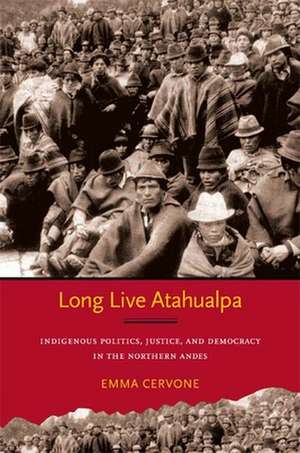Long Live Atahualpa – Indigenous Politics, Justice, and Democracy in the Northern Andes
Autor Emma Cervoneen Limba Engleză Paperback – 6 mai 2012
Preț: 301.20 lei
Nou
Puncte Express: 452
Preț estimativ în valută:
57.64€ • 60.33$ • 47.97£
57.64€ • 60.33$ • 47.97£
Carte tipărită la comandă
Livrare economică 01-15 aprilie
Preluare comenzi: 021 569.72.76
Specificații
ISBN-13: 9780822351894
ISBN-10: 0822351897
Pagini: 352
Ilustrații: 3 photographs, 2 tables, 3 maps
Dimensiuni: 156 x 235 x 15 mm
Greutate: 0.5 kg
Editura: MD – Duke University Press
ISBN-10: 0822351897
Pagini: 352
Ilustrații: 3 photographs, 2 tables, 3 maps
Dimensiuni: 156 x 235 x 15 mm
Greutate: 0.5 kg
Editura: MD – Duke University Press
Recenzii
Long Live Atahualpa is a welcome addition to the literature on Latin American indigenous movements, which has been largely dominated by political scientists working on a macro scale. There has been a great need for ethnographies such as this one, an in-depth examination of local and regional indigenous organizing. In this sensitive, richly documented ethnography, Emma Cervone deftly moves across political, economic, and cultural domains, not privileging one over the other but inquiring into their interconnections. Joanne Rappaport, author of Intercultural Utopias: Public Intellectuals, Cultural Experimentation, and Ethnic Pluralism in ColombiaThis fascinating ethnography makes original contributions to the study of social movements, identity as lived within a social world of invidious stereotypes, and debates over whether multiculturalism as a national policy is empowering or disempowering for indigenous groups. Emma Cervone engages central issues in anthropology, political science, and ethnic studies. She offers a very effective analysis of the dynamics of political consciousness, the internalization of racism, and indigenous movement organizing at different levels. The result is a striking construction of ethnically inflected class issues in the central Andean region of Ecuador. Kay Warren, author of Indigenous Movements and Their Critics: Pan-Maya Activism in Guatemala
Notă biografică
Cuprins
Acknowledgments xi
Introduction: Redefining Indigenous Politics 1
1. The Time of the Lords 39
2. Tixán Becomes Modern 73
3. Invisible Victories 103
4. When the Hills Turned Red 135
5. Words and Scars 163
6. Celebrating Diversity 199
7. Beyond Recognition 233
Conclusion 267
Appendix 279
Glossary 283
Acronyms 285
Notes 287
References 305
Index 323
Introduction: Redefining Indigenous Politics 1
1. The Time of the Lords 39
2. Tixán Becomes Modern 73
3. Invisible Victories 103
4. When the Hills Turned Red 135
5. Words and Scars 163
6. Celebrating Diversity 199
7. Beyond Recognition 233
Conclusion 267
Appendix 279
Glossary 283
Acronyms 285
Notes 287
References 305
Index 323
Descriere
This work looks at indigeneity in the central highlands of Ecuador focusing on the activism of the grassroots organization of Inca Atahualpa. This organization grew in opposition to the hacienda regime that had been in place for many years. Indigenous groups, who were still subject to extensive racism and injustice, began to reconfigure themselves in relationship to the state and to reorganize their strategies to combat the economic and political forces of neoliberalism.













